

Mindful Modeling of Personal Technology. Book - The Art of Screen Time: How Your Family Can Balance Digital Media and Real Life: Anya Kamenetz: Book - Digital Minimalism: Choosing a Focused Life in a Noisy World - Cal Newport. Book - How to Break Up With Your Phone - Catherine Price. The Atlantic - Parents’ Screen Time Is Hurting Kids. A problem therefore arises when the emotionally resonant adult–child cueing system so essential to early learning is interrupted—by a text, for example, or a quick check-in on Instagram. Anyone who’s been mowed down by a smartphone-impaired stroller operator can attest to the ubiquity of the phenomenon. One consequence of such scenarios has been noted by an economist who tracked a rise in children’s injuries as smartphones became prevalent. (AT&T rolled out smartphone service at different times in different places, thereby creating an intriguing natural experiment.
Area by area, as smartphone adoption rose, childhood ER visits increased.) These findings attracted a decent bit of media attention to the physical dangers posed by distracted parenting, but we have been slower to reckon with its impact on children’s cognitive development. Parents Who Use Technology During Family Time May Adversely Affect Children's Behavior, A New Study Says. While much of today's discussion about kids and technology revolves around The Youths being too into their smartphones and tablets, it turns out parents who use technology during family time may be adversely affecting their kids' behavior and overall relationship with them.
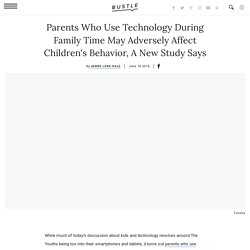
According to a new study, parents who are on their phones or watching TV during activities like meals can cause their children to go into Angelica Pickles mode, and we shouldn't blame the kiddos for doing so. The study, done by Brandon T. McDaniel of Illinois State University and Jenny S. Radesky of the University of Michigan Medical School and published in the journal Pediatric Research, looked into what the researchers call "technoference," where technology interrupts relationships, according to a report on the study posted on Science Daily.
To investigate technoference, researchers worked with 172 two-parent families who each had at least one child five years of age or younger. Dopamine, Smartphones & You: A battle for your time. By Trevor Haynesfigures by Rebecca Clements “I feel tremendous guilt,” admitted Chamath Palihapitiya, former Vice President of User Growth at Facebook, to an audience of Stanford students.

He was responding to a question about his involvement in exploiting consumer behavior. “The short-term, dopamine-driven feedback loops that we have created are destroying how society works,” he explained. In Palihapitiya’s talk, he highlighted something most of us know but few really appreciate: smartphones and the social media platforms they support are turning us into bona fide addicts. While it’s easy to dismiss this claim as hyperbole, platforms like Facebook, Snapchat, and Instagram leverage the very same neural circuitry used by slot machines and cocaine to keep us using their products as much as possible. Never Alone If you’ve ever misplaced your phone, you may have experienced a mild state of panic until it’s been found.
Problematic smartphone use: Digital approaches to an emerging public health problem. How technology has changed our parenting lives. Parents Have More of a Tech Problem Than Kids. We aren’t always the best example.
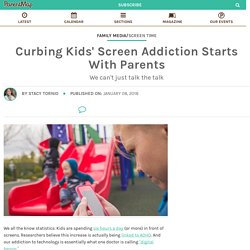
Restrictions and limits are good. For instance, in my house we have a rule of “no phones at least 30 minutes before bed.” However, if I expect my kids to stick to this rule, I have to do it myself. It’s not always easy — you remember that one last email you didn’t get to or you receive a late text. But we can at least strive to follow the same (or similar) rules we put on our kids. If there are no phones at dinner, then it should apply to everyone at the table. We miss moments. Even if you don’t have kids in sports, we all know we’re not as present as we can be. We are too connected. “It also allows us to simply recharge, which is highly necessary in many of our frenzied lives,” Lipman says. We stop doing important things.I’ve always been a reader, but sometimes I go in these long stretches of not reading books at all.
Everyone has those important things that are good for you. We don’t talk enough. Technology and Parenting: How Parental Smartphone Use May Affect Kids. ‘The whole world is in your lap’ The study involved in-depth interviews with 35 caregivers, including moms, dads and grandmothers.
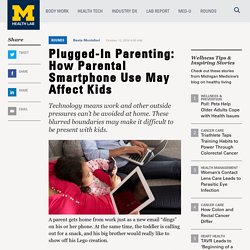
Participants consistently expressed an internal struggle between multitasking mobile technology use, work and children, information overload and emotional tensions around disrupting family routines, such as mealtime. As one mom in a focus group described it, “The whole world is in your lap.” Some caregivers also reported a trickle-down effect. Their emotional response to whatever they were reading on their mobile device — whether it was a work email or bad news — sometimes affected how they responded to children. NPR - Smartphone Detox: How To Power Down In A Wired World. Parents Can Play Important Role in Teaching Children About Technology.
You can start at home by identifying your values and how you want to incorporate technology into your family’s life.
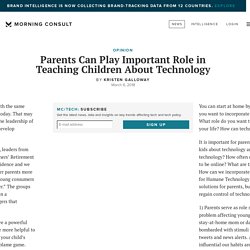
What role do you want technology to play in your house? In your life? How can technology play a positive role? It is important for parents to have conversations with their kids about technology and values. What do you like about technology? 1) Parents serve as role models. 2) Moderation is key. 3) Provide meaningful alternatives. 4) Educate yourself. Do Not Disturb: How I Ditched My Phone and Unbroke My Brain. How to Make Your Phone Limit Your Screen Time for You. Kids & Tech: Tips for Parents in the Digital Age. In a world where children are "growing up digital," it's important to help them learn healthy concepts of digital use and citizenship.
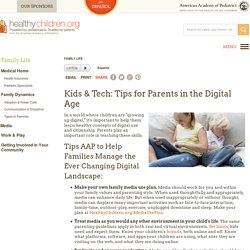
Parents play an important role in teaching these skills. Make your own family media use plan. Media should work for you and within your family values and parenting style. When used thoughtfully and appropriately, media can enhance daily life. But when used inappropriately or without thought, media can displace many important activities such as face-to-face interaction, family-time, outdoor-play, exercise, unplugged downtime and sleep. Media and digital devices are an integral part of our world today.